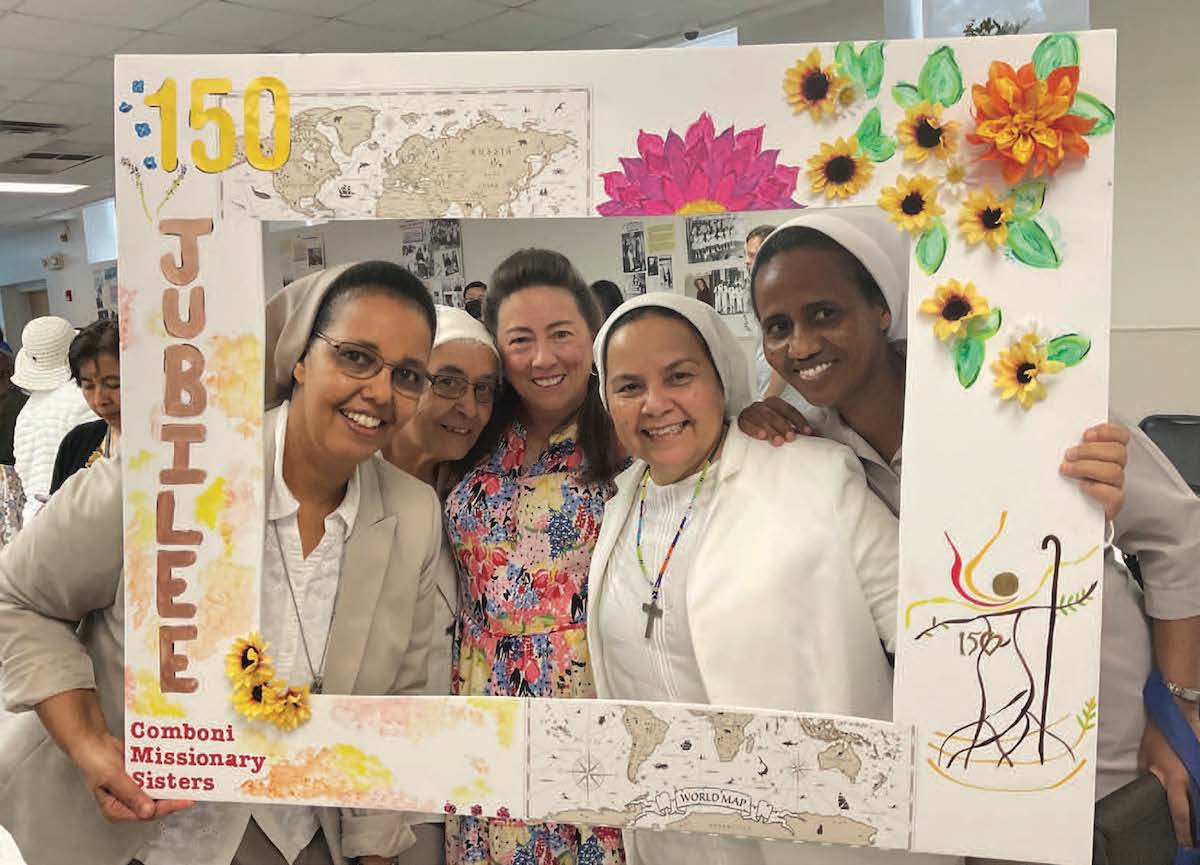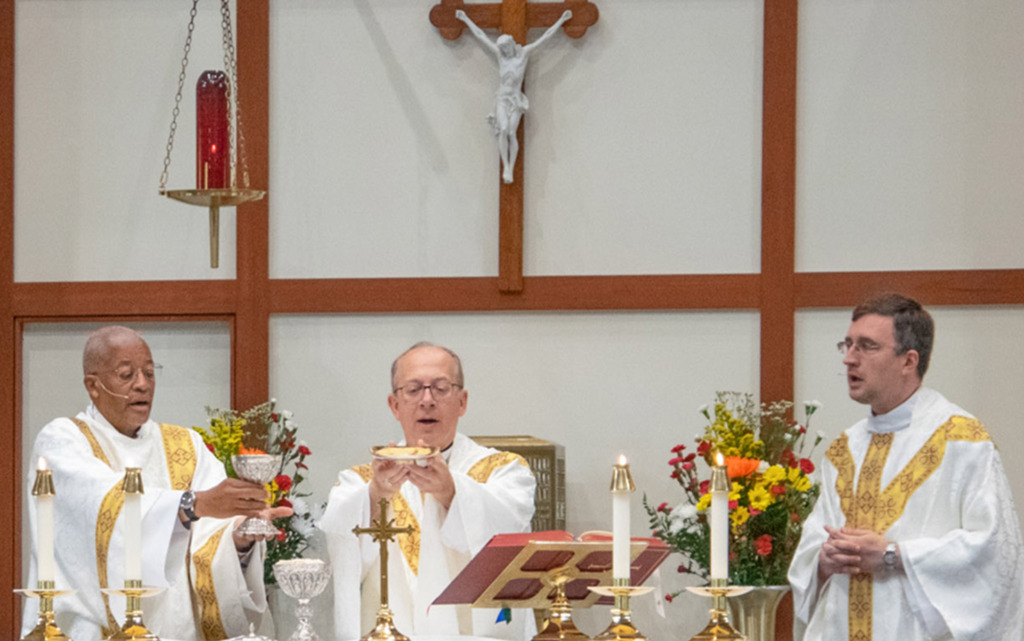Missionary outreach makes impact in Richmond, throughout the world
By the mid-19th century, the words of Jesus had reached many corners of the globe, but Africa remained largely untouched by Christianity. That changed in 1864, when Father Daniel Comboni journeyed to Africa to bring God’s light to those who many dismissed as unworthy. He devoted his life to evangelizing, educating and advocating for the Africans whom he served, founding the Comboni Missionaries in 1867 and Comboni Mission Sisters (CMS) in 1872.
What started as the project of one man has grown into a global movement, with thousands of missionaries serving in dozens of countries across the world, including the United States. A Mass marking CMS’ 150th jubilee was celebrated by Bishop Barry C. Knestout on Saturday, July 9, at Our Lady of Lourdes, Richmond, where CMS has been present since their arrival to the Diocese of Richmond in the 1950s.
Father Comboni was born in 1831 in Limone, Italy. He was canonized a saint in 2003. According to CMS’ website, he was always drawn to the poorest of the poor, the most abandoned, the forgotten. His motto was “Save Africa with Africa” by teaching communities to be self-sufficient. This was a revolutionary concept, but one that proved successful as thousands converted to Catholicism and villages began to flourish.
While the slave trade was still tearing Africa apart, the priest helped free those in bondage, striving to break the chains on the body and soul of the person by offering food and faith as sustenance. He also provided water, medicine, training, churches, clinics and schools. In turn, those he helped went on to help others. The first Sudanese Comboni missionaries were former slaves whom Father Comboni helped unshackle.
Sister Delia Margarita Contreras del Toro spoke of the deep love Father Comboni had for the African people.
“They were neglected, exploited, taken as slaves, and the natural resources of their continent sacked. Not being recognized as human beings, it was thought that they did not have a soul and did not need to be evangelized,” she said. “But Comboni was able to see African people as human beings, with the same dignity as everyone else, and needed to be respected, be treated them accordingly, and they had the right to hear the good news of Jesus Christ.”
Father Comboni also empowered women by putting his complete trust in the nuns who carried out his charisms, which included sharing the Gospel, developing leadership and linking evangelization with a commitment to peace and justice. The women dedicated themselves to the tenets of Father Comboni, working tirelessly to give voice to the voiceless and transform the impoverished lives around them.
Sister Delia Margarita explained the importance of self-sacrifice, saying that “laying down one’s life for a friend” is a “sign of love to Jesus Christ and to people, and in doing so, the fulfillment of one’s own vocation as a missionary.”
‘Held together by God’
CMS’ work is not without risk. Due to pervasive political unrest and war throughout Africa, dozens of CMS nuns have been kidnapped, beaten and killed over the past 150 years.
Sister Maria Cecilia Sierra Salcido recounted, “One year after the death of our Founder (in 1882), eight of our sisters were kidnapped by Islamic extremists. As a result, all the missions in Sudan were destroyed; three sisters died in captivity, and five survived. In 1964, all the Comboni Missionaries were expelled from Sudan and other African countries. In countries such as Uganda, the Democratic Republic of Congo, former Zaire, and Mozambique, rebel groups looted our missions; some sisters were kidnapped, others were injured or traumatized, and two were killed.”
Despite the dangers they faced daily, the sisters returned to their work in Africa and continue to pledge their lives to the people they serve.
Sister Maria Cecilia noted why they continue to walk the “dark valleys.”
“God always searched and brought us back, holding us together, personally and collectively. God’s goodness and kindness continue to astonish us,” she said. “There is a sense of immense gratitude as, after 150 years, we are still here, grounded, grateful and with a sense of mission.”
In addition to the multitude of converts, CMS also established the first Catholic radio station in Sudan and later contributed to a community television station, which helped amplify Father Comboni’s message. While the number of Catholics is dwindling in some European countries, it continues to increase in African nations.
The continent remains pivotal to CMS’ mission, as there is a constant need for help but also a continuous sense of hope.
“There are still situations of oppression that hinder the growth and development of people from having equal rights and living with dignity,” said Sister Adriana Tovar, USA delegation leader of CMS, but there are also many people and Christian communities which are ready to share the harvest and the richness of the Gospels that has been planted in their heart.”
Ministry to refugees
As part of CMS’ mission in this country, Richmond is the headquarters of Comboni Missionary Sisters in the USA. The city was deeply segregated when CMS arrived. When they opened the Holy Angels Nursery in Richmond in 1955, it was one of the first integrated daycares in the region. CMS, which continues to work in Black communities, was also active during the civil rights movement.
Sister Tiberh Hagos serves as the human concerns director at St. Elizabeth, Richmond, a largely Black parish. She has been a member of CMS for 30 years and is its mission education coordinator. She felt called by God to help the poor in much the same way as Father Comboni.
“My vocation is from the Lord; words cannot explain it well. It’s beyond our reason, human wisdom and facts,” she said. “I was captivated by the dream of Comboni’s trust to the African people. The intercultural and intergenerational spirit of Comboni from the very beginning captivated me.”

Sister Tiberh’s work has brought her from Ethiopia, where she was raised, to Italy, Jordan, Dubai, Brazil and the United States. She works personally with refugees, many of whom are from Africa, who have escaped their plight to find a new life in the United States.
She explained that this transition is not easy and that refugees need a strong support system to thrive. Faithful to Father Comboni’s mission, St. Elizabeth parishioners welcome refugees into their faith community and assist them in finding affordable housing and employment. They provide transportation to and from job interviews, school, church, English classes, grocery stores and other places. They help translate bills, letters and menus.
Sister Maria Cecilia works mainly with the growing Latin population at Our Lady of Lourdes, Richmond, and the surrounding community doing similar work as Sister Tiberh. She and other CMS members participate in inter-congregational gatherings, intercultural food festivals and forums on diversity and inclusion.
Outreach at the border
Beyond Richmond, Sister Maria Cecilia also organizes trips to the U.S.-Mexico border to assist asylum seekers. There, CMS members provide food, clothing, shoes, toiletries, paper and crayons for children, and rosaries to those hoping to enter the country.
“The presence of migrants and asylum seekers on both sides of the southern border demands people of faith to reach out and stand in solidarity with migrants and refugees, particularly women and children,” she said.
Sister Mercedes Castillo ministers at shelters and border control detention centers. Though she brings food and other essentials, she also brings attention and compassion.
“I listen to their stories. We pray together and bring hope into their lives. To encounter them and to be with them is so important because they do not feel alone in their struggle to find a better life,” she said.
Another coveted item Sister Mercedes brings are shoelaces, which she calls “life savers.” She relayed that border patrol agents confiscate refugees’ shoelaces when they enter detention centers as a safety precaution. When they are released, their shoelaces aren’t returned. This makes them easy targets for human traffickers who can spot their lace-less shoes and potentially kidnap them for ransom.
To combat this, CMS provides shoelaces and also works with different organizations to battle human trafficking and advocate for refugees’ rights. No matter the mission, needs abound.
Father Comboni held many titles in his life, from priest, to the first bishop of Central Africa, to saint when he was canonized in 2003 by Pope St. John Paul II. But he remained forever a missionary, proclaiming, “Our life, a Missionary’s life, is a combination of grief and enjoyment, exhaustion and hope, suffering and consolation. We work with our hands and our heads; we travel on foot and in canoes. We study, we sweat, we suffer, we rejoice. This is all that Providence wants of us.” A century and a half later, his thousands of missionaries are still bringing light to the world’s darkest corners.
Editor’s note: For further information about the Comboni Missionary Sisters, visit https://combonimissionaries.org.

